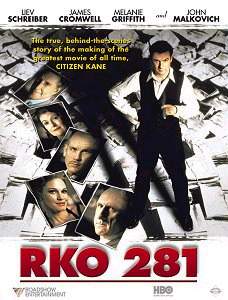Top Qs
Timeline
Chat
Perspective
RKO 281
1999 film by Benjamin Ross about the making of Citizen Kane (1941) From Wikipedia, the free encyclopedia
Remove ads
RKO 281 is a 1999 American historical drama television film directed by Benjamin Ross, written by John Logan, and starring Liev Schreiber, James Cromwell, Melanie Griffith, John Malkovich, Roy Scheider, and Liam Cunningham. The film depicts the troubled production behind the 1941 film Citizen Kane. The film's title is a reference to the original production number of Citizen Kane. It premiered on HBO on November 20, 1999.
Remove ads
Plot
Summarize
Perspective
In 1940, Orson Welles, RKO studio head George J. Schaefer, and screenwriter Herman J. Mankiewicz struggle in making what will be considered the greatest American film, Citizen Kane. Welles and Mankiewicz attend a party at Hearst Castle where meeting the hypocritical and tyrannical William Randolph Hearst gives Welles the inspiration to make a film about Hearst's life. Mankiewicz is against it because he knows Hearst's wrath will be horrible, but Welles says this is the film. Mankiewicz finally agrees.
At first, Welles tries to take credit for everything, including the script, and Mankiewicz is furious with Welles—he faces him, and Welles says he has every right and cuts ties with Mankiewicz. Orson later reconsiders and asks Mankiewicz to continue re-drafting the screenplay, giving him a joint credit. After learning from the gossip columnist Hedda Hopper, who had viewed a press screening, that Welles' film is actually a thinly veiled and exceptionally unflattering biography of him, publishing tycoon Hearst uses his immense power and influence to try to prevent the release of the picture. Hearst's mistress, actress Marion Davies, endures the embarrassment of having their private lives exposed and vilified. Hopper threatens to do the same to the studio executives of Hollywood if they release the film. Marion gives Hearst money when his finances begin to diminish (by selling all the jewelry he gave her and giving him the money in the form of a check).
In the end, after considerable delays and harassment, plus the disintegration of the professional relationship between Welles and Mankiewicz and a costly blow to Schaefer's career, the film is finally released. Its publicity is muted by Hearst's ban on its mention in all his publications and its commercial success is limited. Welles ultimately has the satisfaction of having created one of the most critically acclaimed films of all time.
Remove ads
Cast
- Liev Schreiber as Orson Welles
- John Malkovich as Herman J. Mankiewicz
- Roy Scheider as George J. Schaefer
- James Cromwell as William Randolph Hearst
- Melanie Griffith as Marion Davies
- Liam Cunningham as Gregg Toland
- David Suchet as Louis B. Mayer
- Brenda Blethyn as Louella Parsons
- Fiona Shaw as Hedda Hopper
- Anastasia Hille as Carole Lombard
- Roger Allam as Walt Disney
- Simeon Andrews as John Houseman
- Jay Benedict as Daryl Zanuck
- Ron Berglas as David O. Selznick
- Sarah Franzl as Dorothy Comingore
- Joseph Long as Harry Cohn
- Oliver Pierre as Sam Goldwyn
- Adrian Schiller as Paul Stewart
- Kerry Shale as Bernard Herrmann
- Tim Woodward as Jack Warner
- Angus Wright as Joseph Cotten
- Bobby Valentino as Clark Gable
- Lucy Cohu as Dolores del Río
Remove ads
Production
The script is based in part on the 1996 American documentary film The Battle Over Citizen Kane written by Thomas Lennon and Richard Ben Cramer.[1]
Producer Ridley Scott wanted to film in the Hearst Castle, but was refused access.[2] RKO 281 was filmed in the United Kingdom, mostly around London. The Gothic stairwell in Hearst Castle was filmed in the St Pancras Renaissance London Hotel. Hearst's private quarters and office, including a marble fireplace, were filmed in the high-ceilinged Gamble Room in the Victoria & Albert Museum.[2] The fireplace mantelpiece seen in the room was saved from Dorchester House prior to that building's demolition in 1929.[3] The Hearst castle dining hall and ballroom was filmed in the Great Hall of the London Guildhall.[4]
Reception
On aggregate review site Rotten Tomatoes, the film holds a "fresh" rating of 92%, based on 13 reviews.[5]
Awards and nominations
Remove ads
See also
- Mank (2020)
Notes
- Tied with Thomas Rickman for Tuesdays with Morrie.
Sources
External links
Wikiwand - on
Seamless Wikipedia browsing. On steroids.
Remove ads

